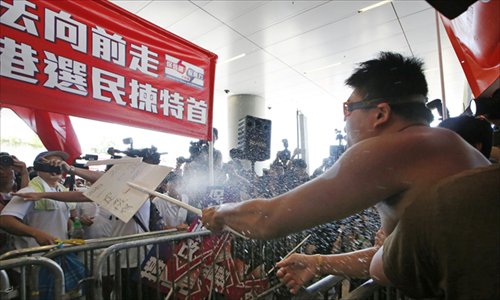HK in showdown over vote
Lawmakers call for support to achieve universal suffrage

Supporters and opponents of a reform plan to elect Hong Kong's 2017 chief executive engage in a confrontation outside the Legislative Council in the special administrative region Wednesday. Legislators started to debate the election proposals on Wednesday. Photo: AP
Renewed conflicts broke out in Hong Kong between opposition radicals and reform advocates as the city's legislators exchanged fire on Wednesday during the first day of a historic debate on electoral reform.
Hong Kong's Legislative Council (LegCo) on Wednesday started a meeting to debate a reform proposal on methods to select the city's next chief executive in 2017. Lawmakers were expected to make speeches before the votes would be cast.
As of Wednesday night, 25 of the 70 lawmakers had spoken. The debate is expected to last for two to three days, with the bill possibly being put to a vote as early as Thursday.
Hundreds of protesters braved the summer heat to stand outside the LegCo building, chanting slogans to express either support or opposition for the government's reform plan.
Robert Chow-yung, spokesperson for the Alliance for Peace and Democracy, warned that lawmakers who voted down the plan would face political consequences.
"As Hong Kong will have a new LegCo election next year, the voters will make a wise choice on whether they still want to keep the opposition lawmakers who have impeded Hong Kong's political development," Chow told the Global Times.
Chow said his organization, together with other reform advocate groups, will continue their rally on Thursday to show support for the reform.
Conflicts broke out several times when members of opposition groups shouted and attempted to crawl across the fences that were used to separate the two sides.
Compared with the last Occupy Central protest when opposition groups managed to rally hundreds of thousands of people for mass sit-ins and protests, the scale of the rally on Wednesday had significantly diminished.
Tension was also running high inside the meeting room of the LegCo building as lawmakers engaged in a war of words. Pan-democratic lawmakers, such as Emily Lau Wai-hing from the Democratic Party, argued that she would vote down the plan as it is a "fake democracy."
However, Starry Lee Wai-king from the Democratic Alliance for the Betterment and Progress of Hong Kong said that opposition lawmakers have wasted too much time on protesting instead of providing constructive suggestions for the reform plan.
"Five million people will lose their right to universal suffrage. The plan for publicly electing the city's top leader and legislature will also be postponed indefinitely," she noted.
The Civic Party's Ronny Tong Ka-wah, a pan-democratic lawmaker who was the subject of wide speculation that he might change his stance and support the government plan, reiterated during the meeting that he will veto the proposal.
Another lawmaker, Priscilla Leung Mei-fun, believes the chance of passing the plan is slim due to strong opposition from the pan-democratic lawmakers.
"Pan-democrats who are moderate and pragmatic should distance themselves from the radical ones. Opposition lawmakers have misjudged the situation as well as the trend of public opinion. It is time that they work with us to reunite Hong Kong society that has been divided over political differences," Leung told the Global Times on the sidelines of the LegCo meeting.
"It makes perfect sense that Hong Kong, as a Special Administrative Region under China, has a responsibility to select a chief executive who loves Hong Kong and loves the country," she noted, referring to remarks made by some opposition lawmakers that the city has no obligation to select a leader who is loyal to the country.
If the reform plan is voted down, Leung believes it is unlikely that the government will put renewed efforts into further developing Hong Kong's electoral framework.
"Public opinion is clear that they hope that Hong Kong can advance its constitutional development. Under One Country, Two Systems, [our political development] must fall within the framework of the Basic Law," Carrie Lam Cheng Yuet-Ngor, Hong Kong's No.2 official, said at the Wednesday meeting.
The current reform plan is based on public opinion collected in the past 20 months and two rounds of public consultation, which includes over 300 public forums and the collection of 200,000 public letters.
Heavy security was deployed around the building in the wake of an alleged bomb plot uncovered Monday believed to be targeting the Wednesday meeting.
The latest poll results, conducted by the University of Hong Kong, Chinese University of Hong Kong and the Hong Kong Polytechnic University, showed that the numbers of supporters of the reform rose to 47 percent among 1,118 people interviewed from June 12 until Tuesday.
2017 chief executive election plan
Nominating committee (1,200 members, includes 300 from business sector, 300 specialists, 300 from the grass roots and religious sector; 300 from political sector)
Preliminary contenders (5-10 people) - each endorsed by at least 120 nominators
Final candidates (2-3 people) - each approved by at least 600 nominators
Universal suffrage - nearly 5 million voters will elect the next Hong Kong chief executive, with the candidate who garners the highest votes winning out.